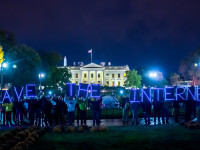This week’s announcement that the U.S. telecommunications regulator plans to roll back net-neutrality regulations sparked an immediate backlash from those who fear that the decision will turn the Internet into a cable-like service dominated by the carriers and deep-pocketed giants that can afford to pay new fees to keep their content on the fast lane.
My Globe and Mail op-ed notes that the U.S. order, which would also block states from carrying out their own versions of policies that stop telecom carriers from leveraging their gatekeeper status by treating similar content or applications differently, is set for a vote next month.










